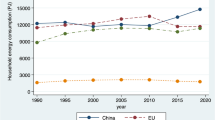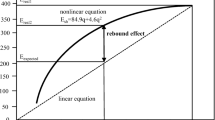Abstract
The Home Appliance Eco-Point System refers to the project executed by the Japanese government from May 2009 to March 2011. The system, while showing signs of slowing down in the latter half of the implementation period, has, to a certain extent, facilitated a demand-promoting effect. Those effects are relatively large, particularly in regions outside the greater national capital district and in households with senior citizens. It can be attributed to the Eco-Point system that “electrical appliances became widespread in those households that had rarely made an effort to save on energy consumption”. Moreover, it can be inferred that the Eco-Point system enhanced the relative utility levels for refrigerators in households in major cities, and for air conditioners and televisions in households with elderly members in small cities. Thus, when implementing environmental policy, we believe that the policy effects can be made more impactful by reasonably determining the household types to target for each good, by setting the subsidy rates according to the differences in the targeted households, and by considering the desirable method of the information provision policy.




Similar content being viewed by others
References
Barba-Gutierrez Y, Adenso-Diaz B, Lozano S (2009) Eco-efficiency of electric appliances: a data environment analysis (DEA). Environ Model Assess 14:439–447. doi: 10.1007/s10666-007-9134-2. http://link.springer.com/article/10.1007/s10666-007-9134-2. Accessed on 28 Dec 2014
Coad C, de Haan P, Woerdorfer JS (2009) Consumer support for environmental policies. Ecol Econ 68:2078–2086
Datta S, Gulati S (2014) Utility rebates for ENERGY STAR appliances: are they effective? J Environ Econ Manag 68:480–506
Davis LW, Fuchs A, Gertler PJ (2014) Cash for coolers: evaluating a large-scale appliance replacement program in Mexico. Am Econ J Econ Policy 6(4):207–238
Deaton A, Muellbauer J (1980) Economics and consumer behavior. Cambridge University Press, London
Gaspar R, Antunes D (2011) Energy efficiency and appliance purchases in Europe: consumer profiles and choice determinants. Energy Policy 39:7335–7346
Hertwich EG, Roux C (2011) Greenhouse gas emissions from the consumption of electric and electronic equipment by Norwegian Households. Environ Sci Technol 45:8190–8196. doi: 10.1021/es201459c. http://pubs.acs.org/doi/abs/10.1021/es201459c. Accessed on 28 Dec 2014
Leathy E, Lyons S (2010) Energy use and appliance ownership in Ireland. Energy Policy 38:4265–4279
Markandya A, Ortiz RA, Mudgal S, Tinetti B (2009) Analysis of tax incentives for energy-efficient durables in the EU. Energy Policy 37:5662–5674
Ministry of the Environment (MOE): http://www.env.go.jp/policy/hozen/green/ecolabel/a04_26.html. Accessed on 28 Dec 2015
Mizobuchi K, Takeuchi K (2015a) Replacement or additional purchase: the impact of energy-efficient appliances on household electricity saving. Discussion Papers 1520, Graduate School of Economics, Kobe University
Mizobuchi K, Takeuchi K (2015b) Did the purchase subsidy for energy-efficient appliances ease electricity shortages after Fukushima? In: Matsumoto S (ed) Environmental subsidies to consumers: how did they work in the Japanese Market?, Routledge, pp 111–138
Mizuho Information & Research Institute (Mizuho-IR) (2015) Results from a survey about power saving behavior of senior citizens. http://www.mizuho-ir.co.jp/publication/report/2015/pdf/setsuden0526v2.pdf. Accessed on 3 Oct 2015 (in Japanese)
Morita M, Arimura TH (2015) A policy evaluation of the eco-point program: the program’s impact on CO2 reductions and the replacement of home appliances. In: Matsumoto S (ed) Environmental subsidies to consumers: how did they work in the Japanese Market?, Routledge, pp 91–110
Murray CK (2013) What if consumers decided to all ‘go green’? Environmental rebound effects from consumption decisions. Energy Policy 54:240–256
Rapson D (2014) Durable goods and long-run electricity demand: evidence from air conditioner purchase behavior. J Environ Econ Manag 68:141–160
Statistics Bureau, Ministry of Internal Affairs and Communications (MIC): http://www.stat.go.jp/english/data/kakei/1560.htm. Accessed on 27 Feb 2015
Stone R (1954) Linear expenditure systems and demand analysis: an application to the pattern of British demand. Econ J 64:511–527
Tanaka M, Ida T (2013) Voluntary electricity conservation of households after the Great East Japan Earthquake: a stated preference analysis. Energy Econ 39:296–304
Thogersen J, Gronhoj A (2010) A. electricity saving in households—a social cognitive approach. Energy Policy 38:7732–7743
Washizu A, Nakano S (2010) On the environmental Impact of consumer lifestyles—using a Japanese environmental input–output table and the linear expenditure system demand function. Econ Syst Res 22:181–192
Yamamoto Y, Suzuki A, Fuwa Y, Sato T (2008) Decision-making in electrical appliance use in the home. Energy Policy 36:1679–1686
Acknowledgments
This study was conducted under the Ministry of the Environment and a FY 2009–2011 environmental economic policy research grant, “A Theoretical and Empirical Study on the Effect of Introducing a New Eco-Friendly System to Market Transactions”.
Author information
Authors and Affiliations
Corresponding author
About this article
Cite this article
Nakano, S., Washizu, A. Changes in consumer behavior as a result of the Home Appliance Eco-Point System: an analysis based on micro data from the Family Income and Expenditure Survey. Environ Econ Policy Stud 19, 459–482 (2017). https://doi.org/10.1007/s10018-016-0145-6
Received:
Accepted:
Published:
Issue Date:
DOI: https://doi.org/10.1007/s10018-016-0145-6




